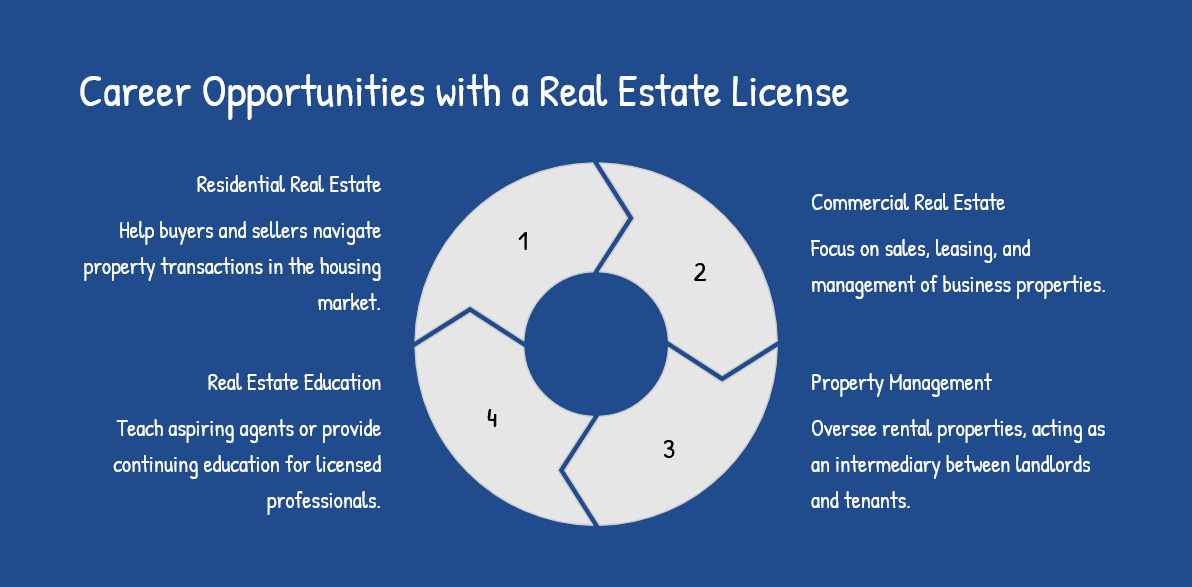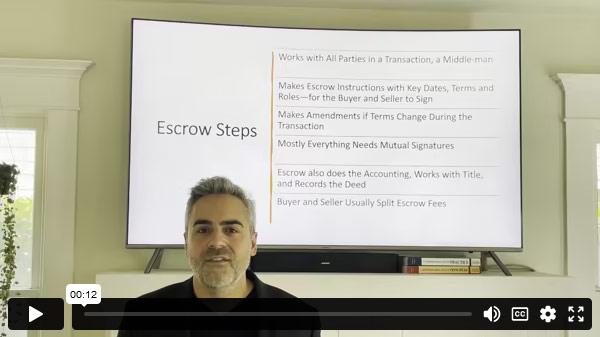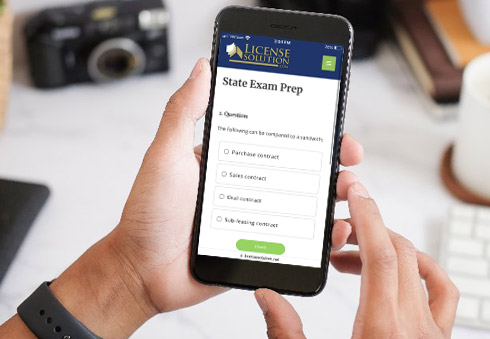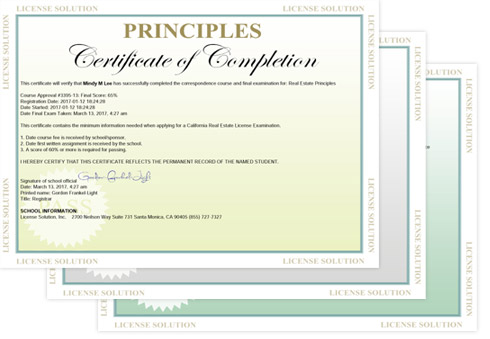Looking to start a real estate career in California? First, you need to get your real estate agent license CA. This involves finishing required coursework, acing the exam, and finding a broker to work with. In this guide, we’ll explain each step in detail to help you successfully get licensed.
Key Takeaways
- To obtain a California real estate license, complete 135 hours of pre-licensing education, pass the licensing exam, and find a sponsoring broker.
- Costs associated with obtaining a real estate license in California range from $477 to $740, including educational and examination fees.
- Career opportunities for licensed agents in California extend beyond sales, encompassing roles in residential, commercial real estate, and property management.
Understanding the California Real Estate License Process
The journey to obtaining a California real estate license involves several critical steps. First, you must complete the mandatory pre-licensing education, which totals 135 hours of coursework. This education is vital as it lays the foundational knowledge of real estate principles and practices that you will need in your career.
After completing the education requirements, the next step is to submit your application to the Department of Real Estate (DRE), including all necessary documentation. Once your application is approved, you will need to prepare for and pass the California real estate licensing exam. This exam is your gateway to becoming a licensed real estate agent, enabling you to represent clients in real estate transactions.
After passing the exam, you must find a sponsoring broker to legally operate as a real estate agent in California. Understanding each step thoroughly will help you navigate the licensing process successfully.
Eligibility Requirements
To qualify for a real estate license in California, you must be at least 18 years old. Additionally, all applicants are required to submit fingerprints for a background check to the Department of Real Estate. This step ensures that applicants meet the ethical standards necessary for practicing real estate.
Interestingly, non-U.S. citizens are also eligible to apply for a California real estate license, broadening the opportunity for a diverse range of aspiring agents. While a criminal history does not automatically disqualify you, certain criminal records may affect your eligibility, and each case is reviewed individually.
Pre-Licensing Education
Completing your pre-licensing education is a cornerstone of obtaining your real estate license. You are required to complete a minimum of 135 hours of pre-licensing education, which includes three college-level courses: Real Estate Principles, Real Estate Practice, and one elective course in a related field.
These courses can be completed through accredited California real estate schools, which offer both online and in-person options. Upon completion, students receive a certificate of completion, which is necessary for scheduling the state licensing exam in a California real estate course.
All courses must be completed within one year of enrollment to remain eligible for the exam.
Application Process
To apply for the California real estate licensing exam, complete the Salesperson Examination Application or the Combined Application and pay the applicable fees. Along with your application, you must provide proof of completion certificates for the required courses and undergo a live scan background check for your california salesperson license.
The application approval process can take between two to six weeks, after which you can schedule your exam. Typically, applicants wait around three months for a test date.
Once you pass the exam, you must submit the Salesperson License Application (RE 202) to the DRE within one year. Once your application is approved, you will receive your license certificate.
Preparing for the Licensing Exam
There are 150 multiple-choice questions on the California real estate licensing exam. Candidates have three hours to finish the exam. Preparing thoroughly is essential, and utilizing notes, YouTube videos, and practice exams can significantly enhance your readiness.
While waiting for your exam date, it’s crucial to study diligently to reinforce your knowledge. The three-hour duration of the exam requires you to manage your time effectively to answer all questions. Passing this exam is a major milestone on your path to becoming a licensed real estate agent in California.
Finding a Sponsoring Broker
Once you pass the licensing exam, you must find a sponsoring broker to legally operate as a real estate agent in California. When selecting a brokerage, it’s important to consider factors such as commission structure, training programs, and the overall company culture.
Choosing the right real estate broker is a personal decision that can significantly impact your success and satisfaction in your real estate career. Take the time to research and interview multiple brokerages to find the best fit for your professional goals and working style.
Top California Real Estate Schools
Choosing the right real estate school is critical. The California Department of Real Estate accredits schools that provide the mandatory 135 hours of pre-licensing education. These schools offer various courses designed to equip you with the knowledge and skills needed to pass the licensing exam and succeed in your real estate career.
There are numerous real estate schools in California, each with its own strengths and offerings. Whether you prefer the flexibility of online courses or the interactive experience of in-person classes, choosing an accredited school that aligns with your learning style and career goals is essential.
Online vs. In-Person Courses
Online real estate courses offer significant flexibility, allowing students to study at their own pace from any location. This option is particularly beneficial for those with busy schedules or other commitments. Many online courses also include interactive study options that help reinforce learning.
In contrast, in-person courses often provide valuable opportunities for networking and direct interaction with instructors. These classes can offer a more structured learning environment and immediate feedback, which some students find beneficial. Consider both online and in-person options to determine which format best suits your needs and learning style.
Overall, both online and in-person courses have distinct advantages and disadvantages. Your decision should be based on your personal preferences, schedule, and how you learn best.
Highly Rated Real Estate Schools
US Realty Training is widely recognized as the top-rated real estate school in California. It is renowned for its comprehensive education, extensive resources, and dedicated student support. Many students consider US Realty Training the best choice for pre-licensing education and exam preparation.
The CE Shop is another excellent option, offering engaging courses alongside a ‘Pass or Don’t Pay’ guarantee, which boosts student confidence. Colibri Real Estate provides a unique tracking dashboard that allows students to monitor their progress and set study goals effectively.
Kaplan Real Estate Education is known for its robust exam prep, featuring practice tests that closely mimic the state exam. For those who prefer audio learning, AceableAgent offers innovative audio lessons via a mobile app, making it easier for auditory learners to absorb the material.
Each of these schools has strengths that cater to different learning preferences and needs, making them excellent choices for aspiring real estate agents.
Costs Involved in Getting Your Real Estate License
Knowing the costs involved in obtaining your California real estate license helps with budgeting and planning. The total costs range from $477 to $740, depending on various factors. These costs include educational fees, examination fees, application fees, and additional expenses such as study materials and travel.
Being aware of these expenses helps you prepare financially and avoid surprises. These costs ensure you meet all the requirements and are well-prepared for your career as a real estate agent.
Course Fees
Course fees for pre-licensing education can vary significantly depending on the real estate school you choose. Classroom courses are generally more expensive due to the overhead costs associated with in-person instruction, while online courses tend to be more affordable.
Some schools, like OnlineEd, offer price-match guarantees, ensuring you get the best value for your money. Knowing these differences can help you choose a program that fits your budget and learning preferences.
Examination and Licensing Fees
The fee for the salesperson examination is $100, while the broker examination costs $150. Additionally, the application fee for the California real estate exam is approximately $60. Once you pass the exam, the fee for the initial license, including the fingerprint fee, is $350.
If you choose to combine your examination and license application, the total cost is $450 for a salesperson and $600 for a broker. These fees are necessary investments in your real estate career, ensuring you are officially licensed to practice in California.
Additional Expenses
Beyond the primary fees, there are additional expenses to consider. Study materials for the California real estate exam can range from $50 to $200, depending on the resources you choose. These materials are essential for thorough preparation and can significantly impact your exam success.
Travel expenses to testing locations can also add to the overall cost, especially if you need to travel a significant distance. Additionally, fingerprint processing costs $49 for California residents, which is another essential expense to factor into your budget.
Post-Licensing Steps
Once you have obtained your real estate license, the next step is to join a brokerage. This step is essential. In California, practicing real estate requires supervision from a licensed broker. The process of joining a brokerage is similar to a job search and involves applying, interviewing, and signing paperwork.
After joining a brokerage, you can access valuable resources such as mentorship and team support, which are essential for a successful start in your real estate career. Joining local boards to access the Multiple Listing Service (MLS) is necessary for conducting business effectively.
Joining a Brokerage
To practice as a licensed real estate agent in California, you must work under the supervision of a licensed broker. This affiliation is necessary to provide real estate services to clients legally. Signing with a brokerage makes you an official agent, allowing you to operate in the california real estate agents market.
When choosing a brokerage, consider factors such as the company’s mentorship opportunities, commission split, and overall culture. These factors significantly impact your professional growth and satisfaction in your new role.
Building Your Network
Networking is a vital component of a successful real estate career. Attending networking events and local real estate meetups can help you expand your professional network and build valuable relationships. These connections can lead to potential clients, partnerships, and career opportunities.
In-person classes also provide better opportunities for direct instructor support and social interaction with peers, further enhancing your professional network. A strong network early in your career sets the foundation for long-term success.
Continuing Education
In California, real estate licenses must be renewed every four years, which requires completing continuing education courses. These courses ensure that you stay up to date with industry changes and maintain your professional competency. Failure to renew your license by the deadline results in an inactive status, requiring reapplication for a new license.
Continuing education courses can cost anywhere from $30 to $100 per course, and many schools offer flexible online options to accommodate your schedule. Staying current with your education keeps your license active and enhances your knowledge and skills, contributing to your success as a real estate professional.
Career Opportunities with a Real Estate License
A California real estate license opens the door to a myriad of career opportunities beyond traditional real estate sales. Whether you’re interested in residential, commercial, or property management roles, the versatility of a real estate license allows you to explore diverse paths in your california real estate career. Licensed real estate agents can also pursue careers as property managers, educators, or referral agents, offering a broad spectrum of possibilities within the real estate industry.
Each of these career paths presents unique challenges and rewards. Knowing the various available opportunities can help you align your career goals with your personal strengths and interests.
Whether you choose to specialize in residential sales, commercial real estate, or property management, your real estate license will serve as a valuable asset in your professional journey.
Residential Real Estate
Residential real estate agents play a critical role in guiding buyers and sellers through the property transaction process. As a buyer’s agent, you represent the interests of the buyer, helping them find suitable properties, negotiate deals, and navigate the intricacies of the purchase process. On the other hand, seller’s agents assist property owners in listing their homes, setting appropriate pricing, and marketing the property to attract potential buyers.
Successful residential real estate agents possess strong market knowledge and negotiation skills, enabling them to provide valuable insights and support to their clients. This career path requires a deep understanding of local market trends, property values, and the overall buying and selling process to help clients make informed decisions.
Commercial Real Estate
Commercial real estate agents focus on the sales, leasing, and management of business properties. This sector includes:
- office buildings
- retail spaces
- industrial properties
- and more
Opportunities in commercial real estate are diverse, ranging from sales and leasing roles to property management and brokerage office management positions.
Working in commercial real estate requires a different set of skills compared to residential real estate. Commercial agents must understand complex financial analyses, market trends, and the needs of business clients.
This challenging yet rewarding field offers substantial growth potential and the opportunity to work on large-scale projects.
Property Management
Property management is another viable career path for those with a real estate license. Property managers act as intermediaries between landlords and tenants, overseeing the operation and administration of rental properties. Their responsibilities include setting rental rates, marketing properties, ensuring maintenance, and addressing tenant complaints promptly.
Effective property managers must ensure that properties comply with relevant laws and regulations while meeting the goals of property owners. This role requires:
- Strong organizational skills
- A keen eye for detail
- Excellent communication abilities to manage relationships with both landlords and tenants successfully
Summary
Obtaining a California real estate license is a multifaceted process that requires dedication, education, and strategic planning. From meeting eligibility requirements and completing pre-licensing education to passing the licensing exam and finding a sponsoring broker, each step is vital in shaping your real estate career. Selecting the right real estate school, understanding the costs involved, and preparing thoroughly for the licensing exam are crucial components of this journey.
After obtaining your license, joining a brokerage, building a professional network, and continuing your education are essential steps for long-term success. The diverse career opportunities available to licensed real estate agents, including residential sales, commercial real estate, and property management, offer numerous paths to explore. By following this comprehensive guide, you will be well-equipped to navigate the complexities of the real estate licensing process and embark on a successful career in the dynamic California real estate market.
Frequently Asked Questions
How long does it take to become a licensed real estate agent in California?
On average, it takes about 3 to 4 months to become a licensed real estate agent in California, though some individuals may complete the process in just a few weeks or extend it over a year.
Is it worth getting a real estate license in California?
Getting a real estate license in California can be highly beneficial, given the state’s high property values and the potential to earn an average of $200,000 as a full-time agent. This market presents significant opportunities for financial independence.
How much does it cost to get your real estate license in California?
Obtaining a real estate license in California typically costs between $200 and $800 for education, plus $305 for exam and license fees, and $49 for fingerprinting. If exam prep materials are not included, budget an additional $100 to $250.
What are the eligibility requirements for obtaining a California real estate license?
To obtain a California real estate license, you must be at least 18 years old, complete the required pre-licensing education, and submit fingerprints for a background check. Meeting these criteria is essential for your success in starting a career in real estate.
How many hours of pre-licensing education are required for a California real estate license?
To obtain a California real estate license, you are required to complete a minimum of 135 hours of pre-licensing education, which must include Real Estate Principles, Real Estate Practice, and one elective course.
TL;DR: Complete your pre-requisite courses by an approved real estate school and apply for the state exam. Utilize an exam prep and pass the state exam to receive your real estate license.















